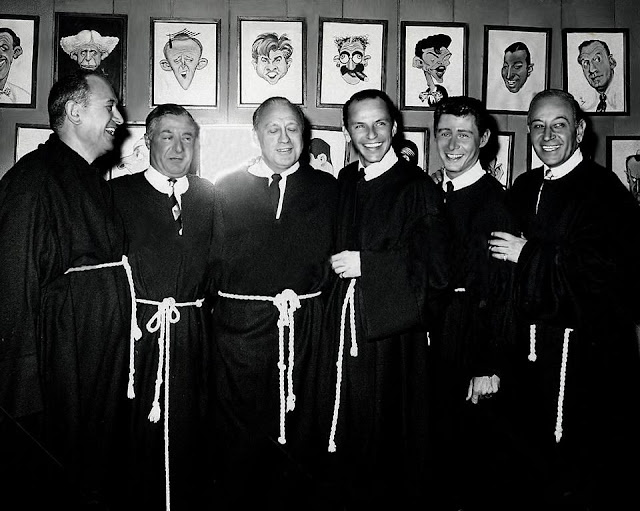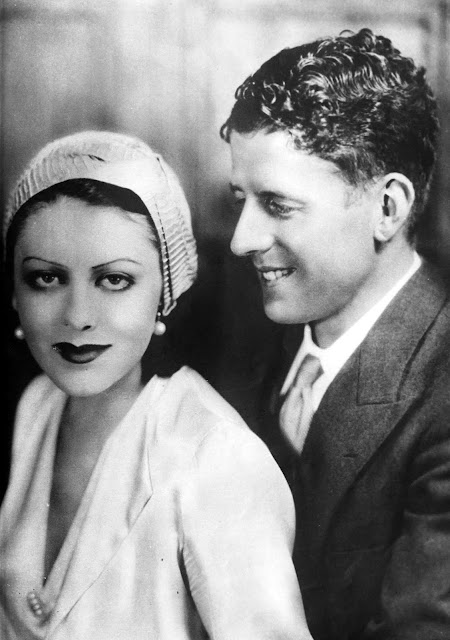Harry Einstein (May 6, 1904 – November 23, 1958), known professionally as Harry Parke and other pseudonyms, most commonly Parkyakarkus, was an American comedian, writer, and character actor. A specialist in Greek dialect comedy, he became famous as the Greek chef Nick Parkyakarkus on the Eddie Cantor and Al Jolson radio programs, and later on a program of his own. He appeared in eleven films (as Parkyakarkas or a close variant) from 1936 to 1945.
Personal life and early career
Einstein was born in Boston, Massachusetts, the son of Sarah (née Klayman), who came from a Jewish family in Russia; and Charles Einstein, a Jewish pawnbroker from Austria, who had an importing business.[1] Einstein attended The English High School in Boston.[2]
Einstein first worked as a newspaper reporter, but then moved into advertising for Boston's Hearst Newspapers.[1] In his spare time, he enjoyed performing comedy routines. During 1924-1925, he became popular on radio as "The Bad Boy from a Good Home," doing comedy skits on Boston station WEEI (AM).[3] He also worked in advertising for the Taylor Furniture Company, where he managed their radio department.[4] He subsequently continued in the advertising business at another Boston furniture store, Summerfield's,[5] while performing dialect comedy for friends at parties.

One of his friends, Boston bandleader Joe Rines, tried to persuade him to become a full-time comedian, but by this time, he was making a good living as advertising manager for Kane's Furniture.[6] Einstein finally agreed to make an appearance on Rines' radio program; he created the Greek character of Nick Parkyakarkus for a skit on that show. The character was very well-received by the listeners, and it ultimately led to the national networks taking notice.[7]
Einstein got his big break nationally when he was first heard as a performer on Eddie Cantor's radio show in 1934.[8]
In addition to performing on Eddie Cantor's program throughout the mid-to-late 1930s, Einstein also was a guest performer on the Al Jolson Show.[9] When he was not performing on radio, he also got some roles in some comedy films during this time, including
Strike Me Pink (1936),
The Life of the Party (1937),
and New Faces of 1937.[10]
He met his second wife, actress Thelma Leeds, while making New Faces of 1937.[11] He and Thelma has three sons; he had one other son with his first wife, Lillian.[12] During the 1930s, Einstein became so inextricably linked with his character that he attempted—unsuccessfully—to change his name legally to Parkyakarkus; a judge denied his request.[13] His star on the Hollywood Walk of Fame bears his character's name instead of his own.[14]
Meet Me at Parky's
As a result of his popularity on the Cantor program, Einstein began a radio show of his own in 1945 called Meet Me at Parky's, featuring the same character, Greek restaurant owner Nick Parkyakarkus. It ran for two seasons on NBC before moving to the Mutual Broadcasting System in 1947 for a third and final season.[15] Einstein wrote most of the program's scripts himself.[16] Sheldon Leonard, Elliott Lewis, and Betty Rhodes were part of the cast, with Rhodes as the female singer as well as supporting work.[17]
Later years and death
Einstein had a long history of heart disease, which eventually began to limit his mobility and stamina. After his TV show was canceled, his appearances were largely confined to Friars' Club roasts.[18] He suffered a fatal heart attack in 1958, at the age of 54, during a roast in honor of Lucille Ball and Desi Arnaz.[19][20] After Einstein delivered his monologue, emcee Art Linkletter remarked, "Every time he finishes, I ask myself, why isn't he on the air in a prime time?"[21] Einstein turned to Milton Berle, who was seated next to him on the dais, and said, "Yeah, how come?"—then slumped into his lap. Berle's shout of "Is there a doctor in the house?" was initially thought to be a humorous ad lib, but the gravity of the situation quickly became clear.[18]

Einstein was carried backstage, where five physicians in attendance (the event was a charity benefit for local hospitals) worked to revive him. One surgeon used his pen knife to make an incision for open heart massage; another used the ends of an electric cord as a makeshift defibrillator. With the remaining comedians on the bill reluctant to continue under the circumstances, Linkletter asked Tony Martin to sing a song; Martin's unfortunate choice was "There's No Tomorrow."[22] Ball then came to the microphone and managed only, "I can say nothing," through tears.[14] Arnaz, the closing speaker, said, "This is one of those moments that Lucy and I have waited a lifetime for, but it's meaningless now. They say the show must go on, but why must it? Let's close the show now by praying for this wonderful man backstage who has made a world laugh."[18]

Despite two hours of continuous resuscitation by the physician volunteers and a rescue squad, Einstein was pronounced dead at 1:20 a.m. The news of his death was the Los Angeles Times' front-page headline the following morning.[18][14][23]
Einstein's funeral service was attended by 300 mourners. After a eulogy by George Jessel, Einstein was interred in the mausoleum at Home of Peace Cemetery in Los Angeles.[24]
Family
Einstein was the father of four sons: the writer Charles Einstein (by his first marriage to Lillian Anshen), and comedians Albert Brooks and Bob Einstein, and advertising executive Clifford Einstein (with his second wife, actress Thelma Leeds).[18] Harry and Lillian divorced in 1929.[25]
In popular culture
The argument has been made that Albert Brooks, who was 11 years old when Einstein died, has dealt with the trauma of his father's passing through vignettes in his movies. For example, early in Defending Your Life (1991), Brooks’ recently deceased character, Daniel Miller, finds himself in an afterlife nightclub, watching a terrible comedian. "How’d you die?" the comic asks him; Albert replies, "Onstage, like you." Later, Meryl Streep's character invites Albert to leave with her. "I can’t," he says, gesturing toward the stage. "That’s my father."[26]

In the Season 9 episode of Comedians in Cars Getting Coffee, "It's Not So Funny When It's Your Mother," Bob Einstein tells host Jerry Seinfeld that the incident of his father dying on-stage at the Friars Club roast, when Bob Einstein was 14 years old, turned him off about performing for many years. Specifically, he was highly offended by the fact both Milton Berle and George Jessel performed their comedy routines as eulogies at Harry Einstein's funeral, feeling it was insensitive, and this made him uncomfortable with comedy.
References
1. "Radio Comic 'Parky' Dies Amid Laughter." Boston Daily Record, November 25, 1958, p. 30.
2. "Will Nick Park His Carcass at City Hall?" Boston Herald, November 5, 1933, p. B1.
3. "Pre-Nuptial Dinner for Harry Einstein." Boston Herald, October 1, 1925, p. 24.
4. "Advertisement for Taylor's Radio Department." Boston Herald, February 1, 1925, p. 3.
5. "Furnishing House Celebrates Banner Year in Business." Boston Herald, January 29, 1928, p. 5.
6. Kliph Nesteroff. The Comedians: Drunks, Thieves, Scoundrels, and the History of American Comedy. New York: Grove Press, 2015, chapter 2.
7. "Nick Parkyakakas and His Rise to Popularity." Boston Herald, May 17, 1934, p. 16.
8. John Dunning. On the Air: The Encyclopedia of Old-Time Radio. New York: Oxford University Press, 1998, p. 220.
9. John Dunning. On the Air: The Encyclopedia of Old-Time Radio. New York: Oxford University Press, 1998, p. 18.
10. "The Last Laugh." San Francisco Chronicle, November 30, 1958, p. M5.
11. McLellan, Dennis (May 31, 2006). "Thelma Bernstein, 95; Mother of Albert Brooks Was Former Actress". Los Angeles Times. Retrieved January 27, 2017.
12. James Bacon. "Parky Dies Amid Laughs He Provoked." Columbus (GA) Daily Enquirer, November 25, 1958,p. 6.
13. "Parkyakarkus Denied Right to Adopt This as Permanent Name." Springfield (MA) Daily Republican, February 26, 1936, p. 4.
14. "Hollywood Walk of Fame-Parkyakarkas". LA Times. Retrieved 31 August 2013.
15. "Meet Me at Parky's". OTRRpedia. Retrieved 4 January 2016.
16. Dunning, John, ed. (1998). On the Air:The Encyclopedia of Old-Time Radio. Oxford University Press. p. 445. ISBN 0199840458. Retrieved 31 August 2013.
17. "Meet Me at Parky's" (PDF). Radio Album. 1948. pp. 54–55. Retrieved 30 August 2013.
18. "Parky Einstein Succumbs After Pocketknife Surgery". The Victoria Advocate. 25 November 1958. Retrieved 23 January 2011.
19. "Parkyakarkus Dies at Banquet After Giving Comedy Monologue". New York Times. United Press International. November 25, 1958.
20. The "Happy Deaths" of Dick Shawn and Parkyakarkus
21. "The Final Performance of Harry Einstein - Parkyakarkas".
22. "CNN Transcript - Larry King Live: Art Linkletter Discusses His Career in Television - June 30, 2000". cnn.com.
23. "Comic Parkyakarkus Dies at Friars Club Dinner". Los Angeles Times. 23 November 1958. Retrieved 31 August 2013.
24. "300 Persons Attend Rites For Einstein". The Index-Journal (Greenwood, South Carolina). November 26, 1958. p. 4. Retrieved January 27, 2017 – via Newspapers.com. Hollywood (AP) – Three hundred persons crowded into a tiny chapel to witness [..] Harry Einstein.
25. "Parkyakarkis Gets Reduction". The Nebraska State Journal. November 10, 1940. p. 4. Archived from the original on 2017-02-02. Retrieved January 27, 2017 – via Newspapers.com. Boston (AP) – [..] his former wife Mrs. Lilian Seidel of New York. The couple was divorced in 1929.
26. Albert Brooks: The Dais of his Life (September 13, 2011). The New Yorker, retrieved May 19, 2016.




























































